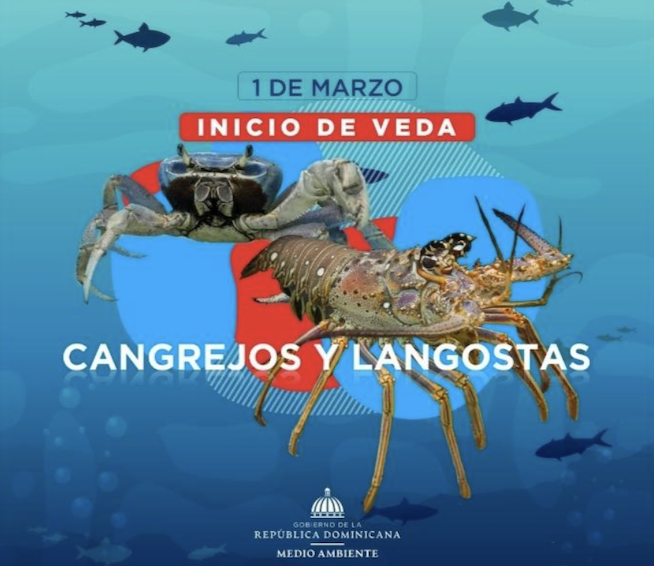
The seasonal ban on the commercialization of lobster and crab is on. Everyone can cooperate by not ordering these foods in restaurants or purchasing them from seafood shops. The ban is in effect from 1 March to 30 June 2025. The ban orders people not to fish, consume or commercialize the seafood.
Thus, it is up to the consumer to be aware of the positive effects the drop in the demand for the seafood can have on the continuing of the species. The ban on capture and commercialization was created to give lobsters and crabs time to recover and procreate.
The fact is that this is the time when lobsters prepare to hatch their eggs. This means that when you kill a pregnant lobster, you are killing hundreds of lobsters.
Caribbean lobsters and crabs are key to the balance in the regional ecosystem. They clean the Caribbean Sea and Atlantic Ocean by feeding on other organisms and serving as biological control. They also demolish organic matter contributing to the well-being and beauty of Dominican beaches and coastal areas.
The reality is that the government does little to police the ban and it is up to consumers to respect the ban and not consume lobster. Restaurants will tell you they are selling frozen stock. Most responsible restaurants, nevertheless, will not sell the lobsters and crabs during the ban. These are the better restaurants.
Others will argue they are selling frozen or imported lobsters and crab meat, but it is difficult to tell who buys imported lobster and crab meat. Take note that Atlantic Ocean lobster is not the same as Caribbean lobster. Also, that the seasonal ban applies to all of the Caribbean.
The Ministry of Environment says the prohibition of capture, storage and commercialization of several species of lobsters and crabs from Tuesday, 1 March until 30 June 2025 guarantees their permanence and adequate reproduction.
The measure seeks to comply with Decree 119-12 of 4 March 2012, Decree 6-18 of 5 January 2018 and is in line with Regulation OSP-02-09, which establishes the simultaneous regional ban for all Central American countries and the Dominican Republic.
The lobsters affected by the ban include the spiny lobster (Panulirus argus); the pinta or langostino (Panulirus guttatus), the stone lobster (Scyllaridas spp) and the mama lobster (Parribacus antarcticus).
The crab species include cave pigeon (Cardisoma guanhumis), zumba or pelú (Ucides cordatus); Moorish crab (Gecarcinus ruricula); little red crab (Gecarcinus lateralis) and the Syrian crab (Callinectes spp).
The ban applies to owners and managers of supermarkets, hotels, restaurants, fish markets, as well as fishermen and collectors.
Violating the fishing ban is classified under Law 307-04 as a “serious offense.” Penalties can include fines ranging from 10 to 200 times the minimum wage of the public sector and/or prison sentences of 2 to 10 years. Yet, unfortunately, these are rarely applied, thus the consumer has the biggest say.
Read more in Spanish:
Ministry of Environment
4 March 2025

